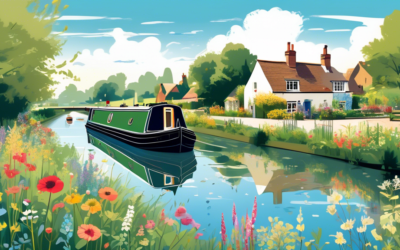Stern Words: Why Checking Your Bilge is Crucial After a Day of Cruising
As you gently bob on the calming waters of the beautiful canals, navigating through scenic routes like the Four Counties, Cheshire Ring, and the enchanting Llangollen Canal in the North West of England, it’s easy to get lost in the moment. The rhythmic chug of the engine, the delightful bird calls from the banks, and the deep breaths of fresh air, all contribute to a surreal boating experience. However, amidst this tranquility and allure, there lies a crucial aspect of boating safety and maintenance that often goes unnoticed until it’s too late: the condition of your bilge.
What is the Bilge, and Why is it Important?
The bilge might not be the first thing that comes to mind when you think about the essential parts of a canal boat, especially if you’re soaking in the picturesque beauty of the Cheshire Ring or navigating the intricate lock systems of the Llangollen Canal. Nonetheless, it plays a pivotal role in the health and safety of your vessel. Located at the lowest point of the boat, the bilge is essentially the area where water collects and is removed. Although a bit of water in the bilge is normal, significant build up can be a sign of trouble. Often this occurs through the dripping stern gland, which is supposed to drip to cool the prop shaft and stern gear along with the grease that is added each day to lubricate the system on a traditional stern gear setup.
The Consequences of Ignoring Your Bilge
Neglecting the bilge might seem harmless at first but can swiftly turn into a boater’s nightmare. Bilge water can accumulate from various sources, including rain, leaks, or even condensation or from the dripping stern gland mentioned above. If not checked and cleared out regularly, the stagnant water can lead to several issues. These range from the unpleasant—such as bad odors and the growth of mold and bacteria—to the downright dangerous, including electrical faults (such as your starter motor, alternators or connections) and, worst-case scenario, sinking or compromising the operation of the engine’s performance (engines do not tend to work when submerged!)
Moreover, the tranquil and often narrow waterways of the North West canals, filled with stunning but potentially challenging lock systems, require your boat to be in optimal condition for safe passage. The last thing anyone wants during a peaceful cruise through these historic waterways is to face an emergency due to a neglected bilge.
The Right Way to Check and Manage Your Bilge
Regular checks and maintenance can prevent the bilge from turning into a problem area. Here’s how you can ensure your bilge is well-maintained:
- Make it a Routine: Incorporate bilge checks into your daily routine, especially after a day of cruising. A quick inspection can help you catch and address issues before they escalate.
- Use Your Senses: Look for any unusual accumulation of water. Smell for odors that might indicate the beginning of mold or bacteria growth. Listen for the sound of your bilge pump—it should not be running constantly, as this could indicate a leak.
- Keep it Clean: Regularly clean the bilge to prevent oil, fuel, or waste accumulation which can not only damage the boat but also harm the environment. Being on the waterways, it’s our responsibility to preserve the natural beauty around us.
- Monitor Bilge Pump Operation: Ensure your bilge pump and any alarms are working correctly. They are your first line of defense against water accumulation.
- Add Grease To Stern Gear: At the end of each day when checking your bilge, if you have a traditional greased stern gear then remember to add grease through the remote greaser. This creates a water tight seal overnight and also lubricates the stern gear ready for the next days cruising.
It’s also worth mentioning that different routes like the serene Llangollen Canal or the more bustling Cheshire Ring might present unique challenges to your bilge system due to varying conditions and traffic. Adapting your maintenance routine to the environment you’re cruising in can be beneficial.
Anecdotes from the Waterways
Tales from seasoned boaters along the North West’s canals often highlight the importance of bilge maintenance. One memorable story involves a couple cruising down the Llangollen Canal; they were so captivated by the engineering marvel that is the Pontcysyllte Aqueduct that they neglected their bilge checks for days. It wasn’t until they noticed an unusual tilt to their boat that they discovered a significant water buildup in their bilge, narrowly avoiding a crisis. This story serves as a stern reminder of why checking your bilge is not just about maintenance but about safeguarding your cruising experience.
A Final Word of Caution
As you navigate through the serene yet complex waterway systems of the North West, whether you’re a novice embarking on your first boating adventure or a seasoned sailor, always remember the importance of bilge checks. They might seem like a minor detail amidst the vast beauty and excitement of canal cruising, but they are crucial for a safe and enjoyable journey. After all, as the old saying goes, it’s better to be safe than sorry—especially when you’re in the middle of water.
So, as the sun sets on another beautiful day on the canals, and you retire to the cozy confines of your canal boat, let not the tranquility of your surroundings lull you into complacency. A quick check of your bilge today can ensure many more serene days of cruising ahead. It’s not just about maintenance; it’s about crafting a seamless and safe experience on the water that you’ll cherish for years to come.
In the end, consider these stern words as both a caution and a call to action. Your adventures on the canals of the North West are laden with beauty and history. Preserving the health of your bilge is not just a technicality; it’s an integral part of your journey, ensuring that your memories on these historic waterways remain undisturbed.






0 Comments